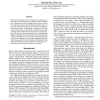Free Online Productivity Tools
i2Speak
i2Symbol
i2OCR
iTex2Img
iWeb2Print
iWeb2Shot
i2Type
iPdf2Split
iPdf2Merge
i2Bopomofo
i2Arabic
i2Style
i2Image
i2PDF
iLatex2Rtf
Sci2ools
FLAIRS
2009
2009
Modeling Belief Change on Epistemic States
Belief revision always results in trusting new evidence, so it may admit an unreliable one and discard a more confident one. We therefore use belief change instead of belief revision to remedy this weakness. By introducing epistemic states, we take into account of the strength of evidence that influences the change of belief. In this paper, we present a set of postulates to characterize belief change by epistemic states and establish representation theorems to characterize those postulates. We show that from an epistemic state, a corresponding ordinal conditional function by Spohn can be derived and the result of combining two epistemic states is thus reduced to the result from combining two corresponding ordinal conditional functions proposed by Laverny and Lang. Furthermore, when reduced to the belief revision situation, we prove that our results induce all the Darwiche and Pearl's postulates.
Artificial Intelligence | Belief Revision | Epistemic States | FLAIRS 2009 | Ordinal Conditional Functions |
| Added | 17 Feb 2011 |
| Updated | 17 Feb 2011 |
| Type | Journal |
| Year | 2009 |
| Where | FLAIRS |
| Authors | Jianbing Ma, Weiru Liu |
Comments (0)

